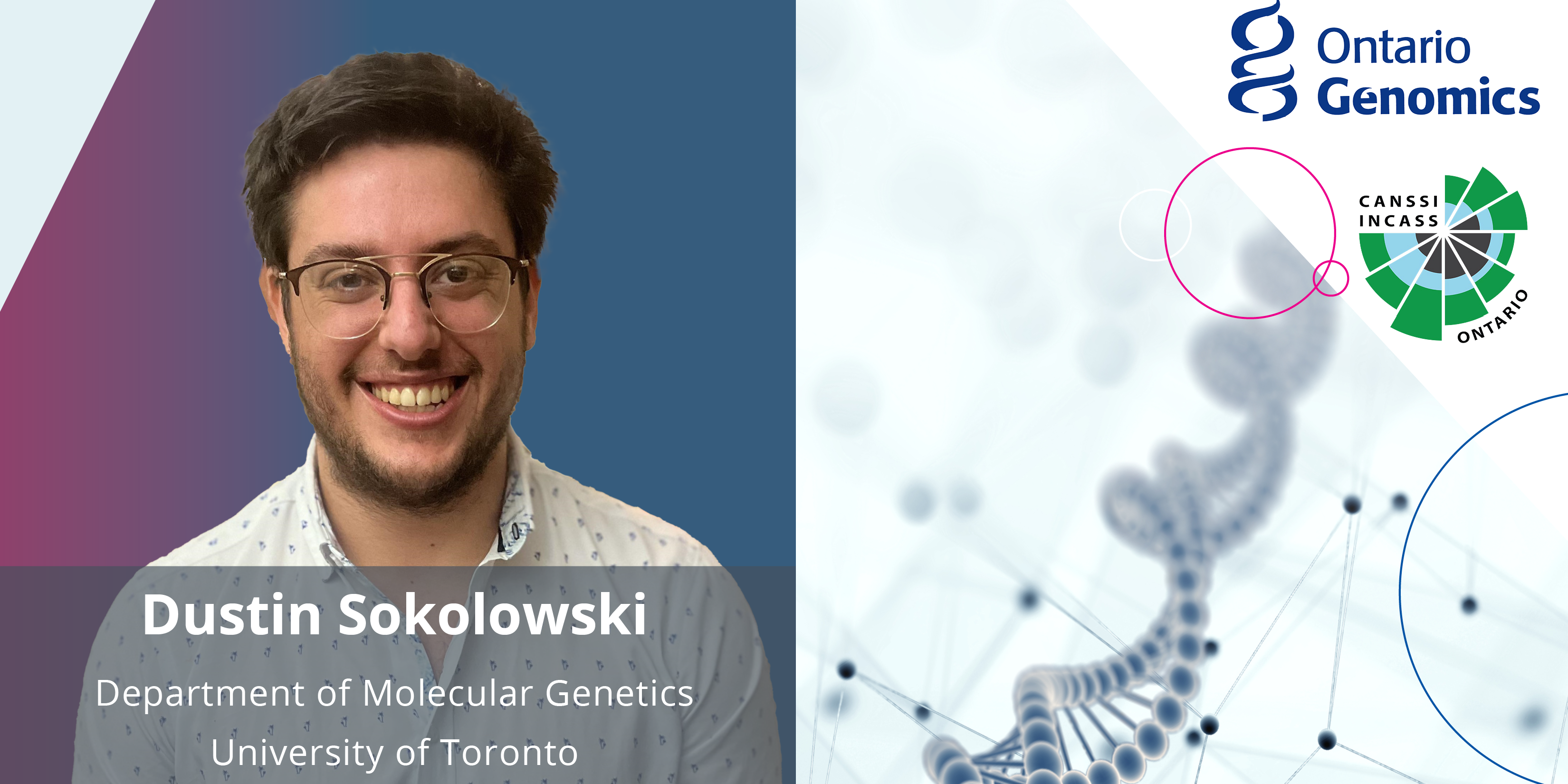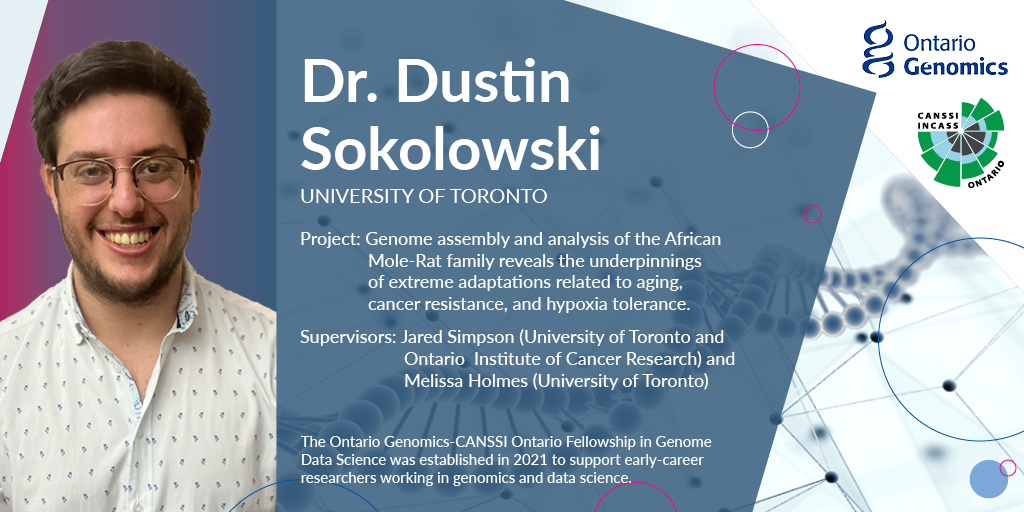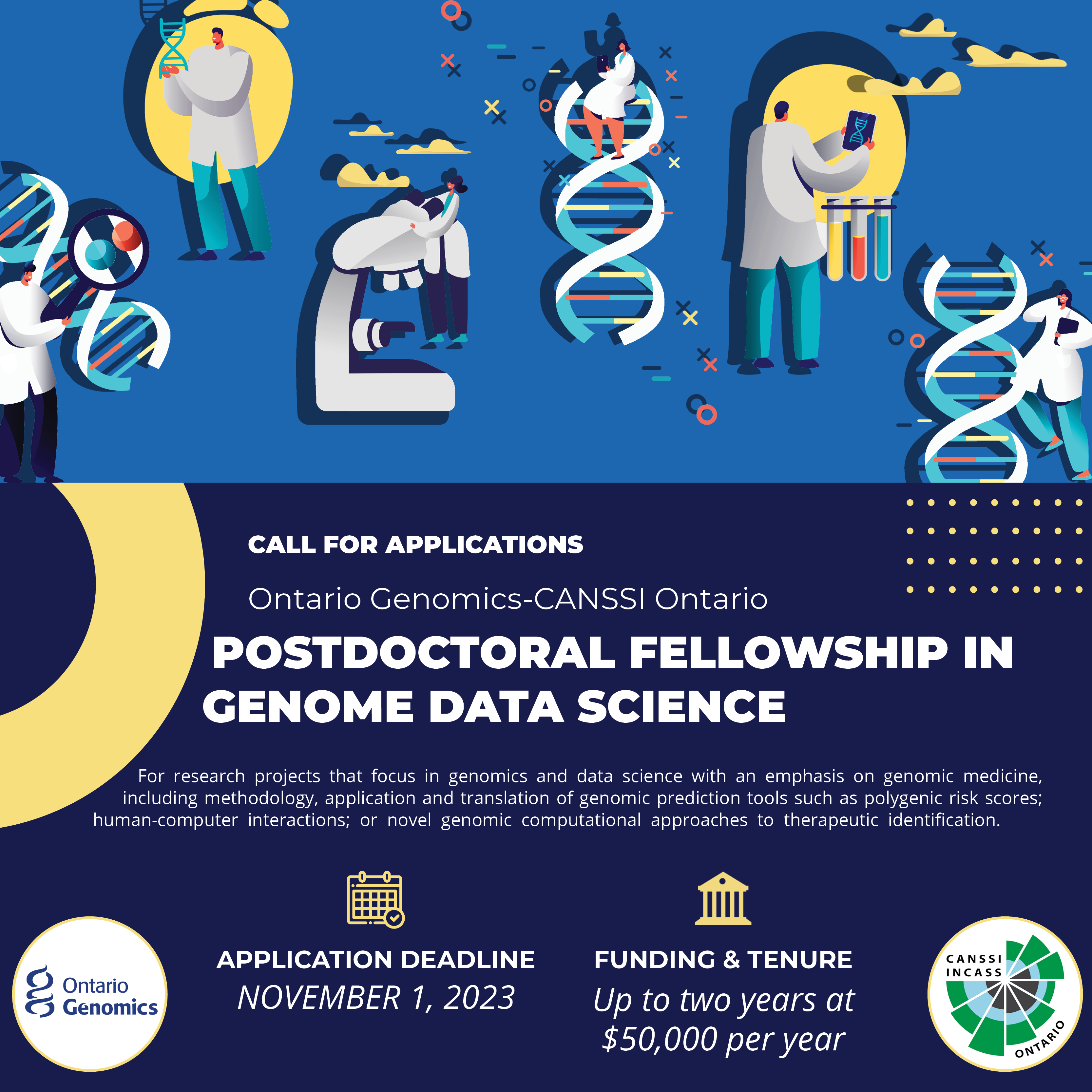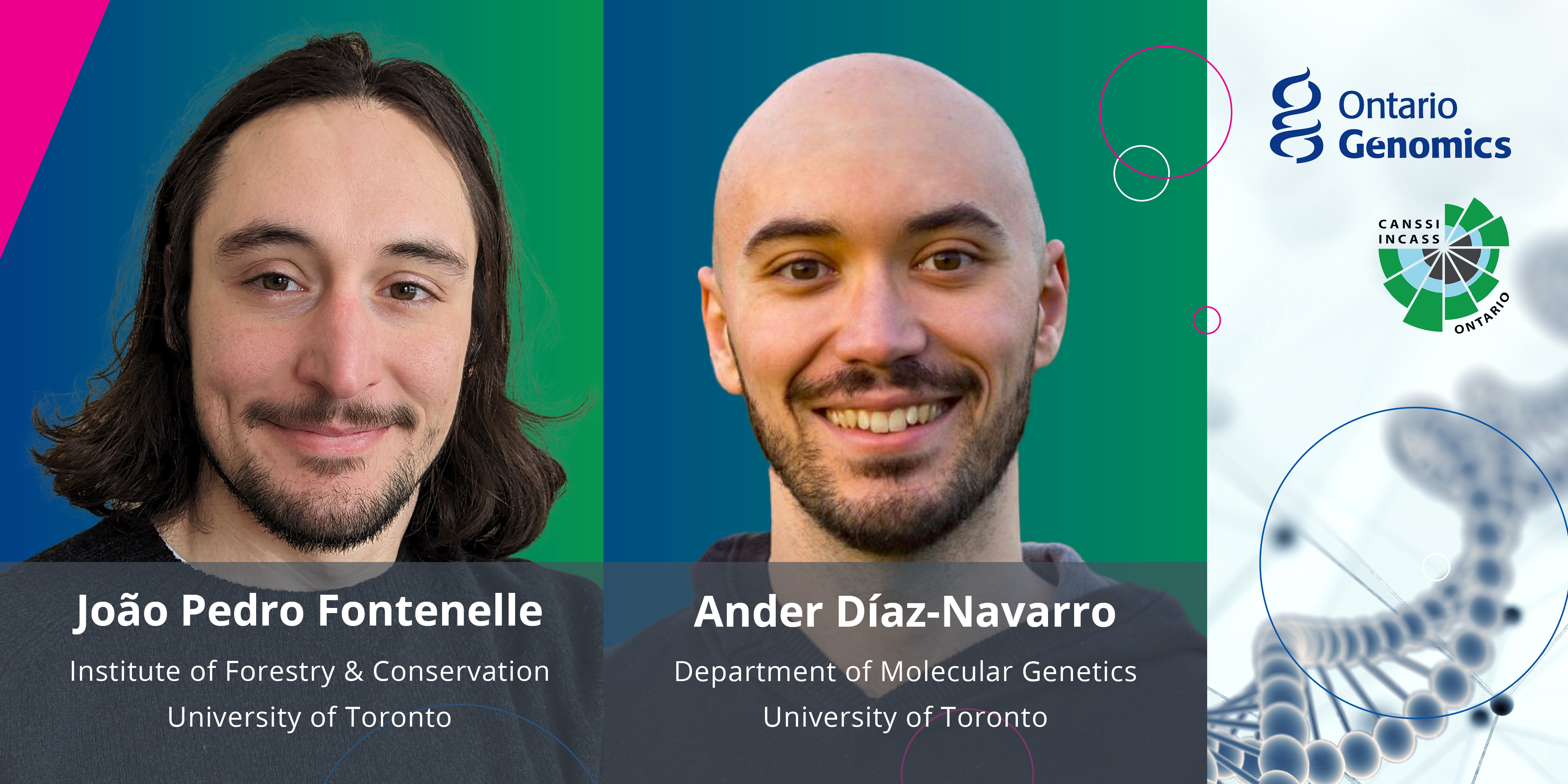Ontario Genomics-CANSSI Ontario Postdoctoral Fellowship in Genome Data Science – Award Recipient: Dustin Jonathan Sokolowski
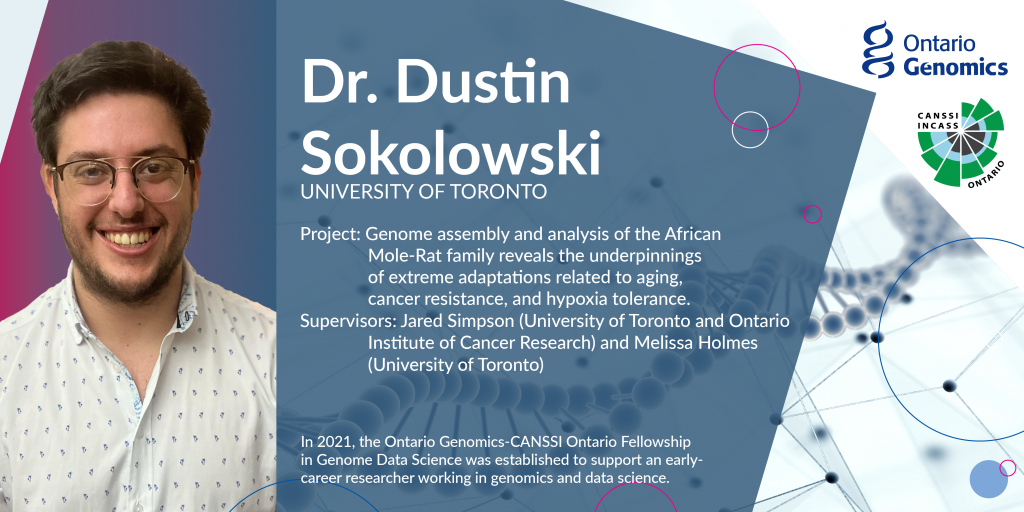
Ontario Genomics and CANSSI Ontario (OG-CO) are pleased to announce Dustin Jonathan Sokolowski as the recipient of Ontario Genomics-CANSSI Ontario Postdoctoral Fellowships in Genome Data Science.
Dustin Sokolowski is a Post-Doctoral Fellow in the Department of Molecular Genetics at the University of Toronto. He completed his undergraduate degree in Genetics at Western University, where he discovered his passion for data analysis and interpretation in a biological context. During the summer, he worked in the Genes and Genome Biology department at SickKids under Drs. Paul Arnold and Anna Goldenberg, where he began learning about cutting-edge techniques and the crucial challenges in gleaning biology from multi-omic datasets
Dustin’s PhD thesis involved developing and applying bioinformatic methods to improve the interpretability of transcriptomic data analysis. He developed single-cell mapper (scMappR), which assigns differentially expressed genes from tissue-level RNA-seq to their cell-type of origin (PMID: 33655208). He developed the Differential Expression Enrichment Tool (DEET), an interactive database of over 3,000, to consistently reprocess differential gene expression analyses (PMID: 36694664). Lastly, he integrated these tools with state-of-the-art bioinformatic approaches to identify gene signatures involved in pubertal regulation in the mouse hypothalamus (https://doi.org/10.1101/2023.10.12.562121).
Collaboration is Dustin’s favourite aspect of his scientific journey (PMIDs: 36221127, 37481629, 37350250). These collaborations provided learning opportunities otherwise inaccessible, and have built an invaluable network of collaborators and friends. One key collaboration involves Dr. Melissa Holmes, who was interested in applying transcriptomic and epigenetic techniques to discover mechanisms underlying the reproductive suppression seen in naked mole-rats (Heterocephalus glaber; NMR). This collaboration has expanded into a multi-institutional, international effort to understand the genetic underpinnings of the NMRs unique physiology. Dustin spearheads a de novo genome assembly and annotation for the NMR (GCA_944319715.1). Dustin’s post-doctoral fellowship with Drs. Melissa Holmes and Jared Simpson is dedicated to the assembly and annotation of the wider African mole-rat family (Bathyergidae) and to identify genomic regions responsible for the adaptation of medically relevant traits.
When not working, Dustin is exploring the outdoors through camping, hiking, rock climbing, or playing his guitar.
OG-CO PDF Project Synopsis
Recent advances in sequencing technology have enabled high-quality, nearly complete genome assemblies to be routinely generated, raising the possibility of performing comparative genomics projects at scale, thereby allowing for an unprecedented application of non-model organisms in genomic medicine. Identifying genomic regions associated with extreme adaptation in these non-model organisms can reveal core mechanisms involved in organismal development, response to external stimulus, and disease. Adaptation typically occurs by altering the function and regulation of existing genes and pathways. The African mole-rat family (Bathyergidae) are subterranean rodents with several extreme adaptations. The naked mole-rat is the most commonly studied species in the family due to its combination of extreme adaptations (e.g., longevity, cancer resistance, eusociality, thermoregulation) and their ability to be studied in a laboratory setting. Applying genomic, transcriptomic, and epigenomic approaches has helped explain some unique physiologies, such as their unique immune response and large ovarian reserve. Despite these findings, the genetic underpinnings of the NMR’s unique physiology remain unclear, in large part because of the lack of a high-quality genome for the NMR and the remaining mole-rat species. Crucially, each species within the Bathyergidae family contains a unique combination of extreme adaptations shared with the NMR, and species in the Bathyergidaes family provide more genetically similar species to the NMR than currently existing genomes (e.g., guinea pig, American porcupine). In his PDF project, Dr. Sokolowski will focus on three adaptations with clear implications in medical genomics: extreme longevity, tumour resistance, and hypoxia, which have medical implications involved in metastasis in cancer, breathing disorders (e.g., asthma), and heart disease.
About
The Ontario Genomics-CANSSI Ontario Postdoctoral Fellowship in Genome Data Science was created to support research projects and attract, retain, and nurture Highly Qualified Personnel (HQP) combining genomics and data science within Ontario. These HQPs possess a diverse skill set spanning statistics, computational biology, bioinformatics, computer science, epidemiology, engineering, genetics, or mathematics.
Established in 2000, Ontario Genomics is a not-for-profit organization leading the application of genomics-based solutions to drive economic growth, improved quality of life, and global leadership for Ontario. As part of its strategic vision, Ontario Genomics (OG) is dedicated to supporting the development of educational resources that demonstrate how genomics plays a vital role to address key challenges in our society. Ontario Genomics also plays a role in advancing genomics projects and programs across the province by supporting the development of proposals, helping researchers access diverse funding sources, and finding the right industry partners to take this research out of the lab to apply it to the world’s most pressing challenges. Since its inception, Ontario Genomics has raised more than $1.27 billion for genomics applied research in Ontario and directly supported more than 9,100 trainees and jobs. OG supports 110+ active projects, 500+ impactful partnerships and has secured $1.34 billion in follow-on investments.
CANSSI Ontario is the Ontario Regional Centre of the Canadian Statistical Sciences Institute (CANSSI). Its goal is to strengthen and enhance research and training in data science by developing programs that promote interdisciplinary research and enable multidisciplinary collaborations.

